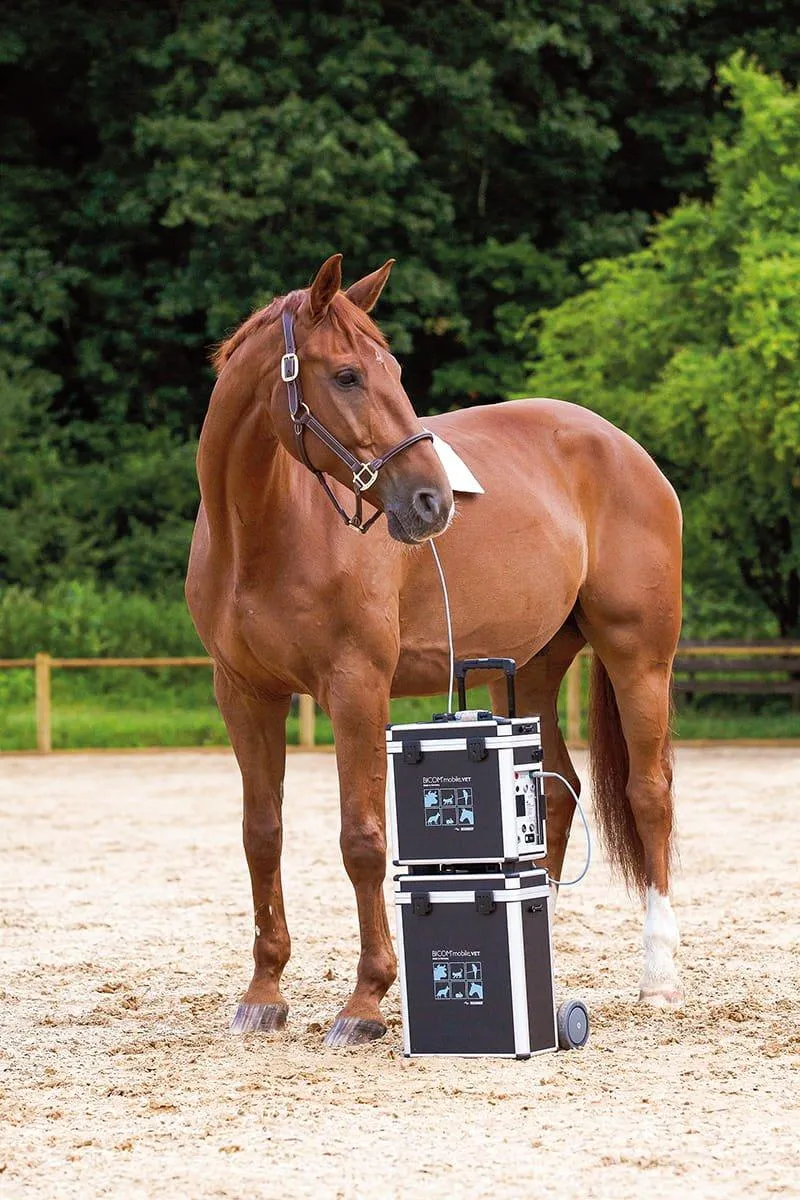Welcome to our veterinary page!
in this section, you can discover what bioresonance therapy is and how it can be a useful tool to enhance your veterinary practice.
Bioresonance therapy is an alternative treatment method that uses electromagnetic frequencies to address imbalances in the body. When applied to animals, it can help to alleviate a range of health conditions by promoting natural healing processes. This non-invasive therapy is gaining popularity among pet owners who are looking for safe and effective ways to support their animal’s well-being. Learn more about bioresonance therapy for animals and how it may benefit your furry friend.
Bioresonance has long been used to identify and target the root cause of a variety of health problems in people. More recently, this technology has also been applied to pets and other animals with much success. BICOM® bioresonance therapy can be used in the treatment of various types of animals, including, Dogs, Cats, Horses, Rodents, Birds and more.
Would you like to know more?
A range of experiences, research and scientific studies into the efficacy of bioresonance treatment can be found on our Blog section. This is where you can view the latest findings and articles about therapy with the BICOM® or browse the article archives.
You can also learn more about the features of the specific devices in the BICOM® range through our therapy machine page. This can help you to see which product will suit you, your clients and your practice best.

Best Vets for Pets Why Specialized Care Matters for Health
Why Traditional Vets for Pets Might Not Be Enough for Your Pet’s Health
As pet owners, we all want the best for our furry, feathered, and scaly friends. For many years, vets for pets have been the go-to professionals for pet healthcare. Traditional veterinary practices have been critical in keeping our pets healthy, but in recent years, many pet owners are realizing that traditional care might not always provide the best solutions for their pets. With increasing awareness and advancements in pet healthcare, specialized treatments and alternative therapies have become more popular.
In this blog post, we will delve into why traditional vets for pets might not always meet the specific health needs of your pet. Additionally, we will discuss how specialized care, such as visiting an avian specialist for birds or exploring holistic treatments for various pets, can provide better outcomes.
The Limitations of Traditional Vets for Pets
1. Generalist Approach
Traditional veterinarians are typically general practitioners. They are trained to treat a wide range of animals, but this means they might not have in-depth expertise in specific species. This generalist approach works for most dogs and cats, but for exotic pets like birds, reptiles, or small mammals, a general vet might not be the best option. These animals often have unique health requirements that are better addressed by specialists.
Lack of Specific Knowledge: Traditional vets might not be familiar with the subtle health issues that are specific to exotic pets.
Limited Diagnostic Tools: Some traditional practices might not be equipped with the right diagnostic tools for specialized care.
Broader Scope: While general knowledge is great for routine care, it can be insufficient when dealing with complex or specific pet health concerns.
2. Conventional Medicine Focus
While traditional vets play a vital role in providing care, many of them focus primarily on conventional medicine, which includes things like vaccinations, antibiotics, and surgical procedures. While these treatments are essential, they may not always address the root causes of certain health issues.
Symptom Management Over Prevention: Traditional care often focuses on managing symptoms rather than addressing underlying health problems.
Limited Preventive Care: While traditional vets can treat illnesses, they may not always focus on preventive care that could help avoid chronic conditions.
Dependence on Medication: Many traditional vets lean on prescribed medications, which can sometimes result in negative side effects or be ineffective for long-term health solutions.
3. Lack of Knowledge in Alternative Therapies
In recent years, many pet owners have started looking for alternative treatments for their pets, such as acupuncture, chiropractic care, and even herbal medicine. However, many traditional vets are not trained in these methods, which can be crucial in providing holistic care for certain conditions.
Acupuncture and Chiropractic Care: These therapies can be highly effective for pets suffering from chronic pain, mobility issues, or stress. However, traditional vets may not always have the training or knowledge to implement them.
Herbal Medicine: Natural remedies can complement conventional treatments and improve a pet’s quality of life. Without proper knowledge, traditional vets may not provide these options.
Holistic Care: Holistic vets treat the animal as a whole, integrating body, mind, and spirit, which can sometimes be overlooked by conventional practitioners.
4. Under-Emphasis on Preventive Care
Traditional vets often focus on treating immediate concerns, especially when symptoms are visible. Preventive care—like dietary recommendations, vaccinations, and early screening tests—can sometimes take a backseat, resulting in long-term health risks for your pet.
Chronic Conditions Can Be Missed: Pets can develop conditions over time that may not be immediately noticeable. Traditional vets might focus on acute conditions rather than checking for subtle signs of chronic illness.
Diet and Nutrition: Proper nutrition is vital in preventing many pet illnesses, but traditional vets might not always prioritize it in their consultations.
Specialized Vets: A Growing Necessity for Pet Health
The increasing awareness about pets' specific health needs has led to the rise of specialized veterinary care. Many pet owners are now turning to vets who focus on particular species or treatment approaches to ensure their pets receive the best possible care.
1. Avian Vets: Why Birds Need Special Attention
If you’re a bird owner, you already know how different their health care needs are from those of cats or dogs. Avian vets specialize in the care of birds, which have unique biological systems and require special care.
Unique Health Issues in Birds
Respiratory Sensitivity: Birds have highly sensitive respiratory systems, which makes them more susceptible to diseases.
Nutrition: A bird’s diet is crucial to its health, and many general vets might not be aware of the precise nutritional requirements birds need.
Behavioral Indicators: Birds do not display pain in the same way dogs or cats do, which makes it harder to detect illnesses early on. An avian specialist is trained to understand these subtle signs.
Reproductive Care: Birds have unique reproductive systems, and an avian specialist is better equipped to deal with egg-laying problems, reproductive issues, and hormone imbalances.
2. Holistic and Integrative Vets: A Comprehensive Approach to Pet Care
Many pet owners are now exploring a more holistic or integrative approach to their pet’s health. Holistic vets integrate alternative therapies like acupuncture, massage therapy, and dietary supplements with traditional treatments to address the overall health of pets.
Benefits of Holistic Care
Non-Invasive Treatments: Holistic care often involves less invasive methods like acupuncture and massage therapy, which can be beneficial for pain relief and recovery from injuries.
Personalized Care: Holistic vets take a more personalized approach, focusing on the individual needs of your pet.
Long-Term Health Solutions: Instead of simply addressing immediate symptoms, holistic care aims to improve overall well-being and prevent future issues.
3. Specialized Treatment for Exotic Pets
Exotic pets such as reptiles, small mammals, and amphibians require specialized care that traditional vets might not be able to offer. Specialized exotic pet vets have in-depth knowledge about these animals’ unique needs.
Why Exotic Pets Need Specialized Care
Unique Anatomy: Exotic pets have different anatomical structures that require specific treatments.
Specialized Diets: Many exotic animals have dietary needs that are quite different from those of traditional pets like cats and dogs.
Temperature and Habitat Needs: Reptiles, for example, require very specific temperature and environmental conditions that traditional vets might not be fully aware of.
When Should You Consider Specialized Vets for Pets?
While traditional pets can handle general health needs like vaccinations, checkups, and common illnesses, there are times when seeking out a specialized vet becomes necessary. Here are some situations where you should consider seeing a specialist:
Chronic Health Issues: If your pet is suffering from long-term conditions like arthritis, digestive problems, or stress, a specialist can provide targeted treatments that may be more effective than traditional care.
Exotic Pets: For birds, reptiles, and small mammals, it’s important to consult an avian vet or an exotic animal vet to address specific health issues that traditional vets may not be familiar with.
Behavioral Changes: If your pet is showing unusual behaviors, such as sudden aggression or lethargy, specialized vets can help identify underlying health problems that may not be immediately apparent.
After Surgery: If your pet has undergone surgery and is recovering slowly, a holistic or rehabilitation vet can help with recovery through therapies like acupuncture or physiotherapy.
How to Find the Right Vet for Your Pet’s Needs?
Finding the right care for your pet is crucial. Here’s how you can ensure your pet receives the best healthcare:
1. Research and Ask for Recommendations
Start by researching vets who specialize in the type of care your pet requires. Ask for recommendations from other pet owners or check online reviews to ensure the vet has a solid reputation.
2. Visit the Clinic
Don’t hesitate to visit the vet clinic and ask questions about the services offered. This gives you a chance to see the clinic’s environment and ask about the vet’s experience with specialized care.
3. Understand Your Pet’s Health Needs
Different pets have different health needs, and you should be aware of what treatments or care they may require. Understanding your pet’s breed and specific conditions will help you choose the right vet.
Conclusion
While traditional vets for pets are essential in ensuring the basic health of your pets, there are times when their care might not be enough, especially for pets with specific needs or chronic conditions. Specialized vets, like avian vets, can offer the expertise required for animals with unique health concerns, while holistic care can complement traditional medicine by addressing the root causes of health issues.
By exploring specialized care options, you can ensure your pet lives a long, healthy, and happy life. Don’t hesitate to look into alternative treatments and seek out a vet who truly understands your pet’s unique needs.
Quick Links





Facebook
Instagram
Mail